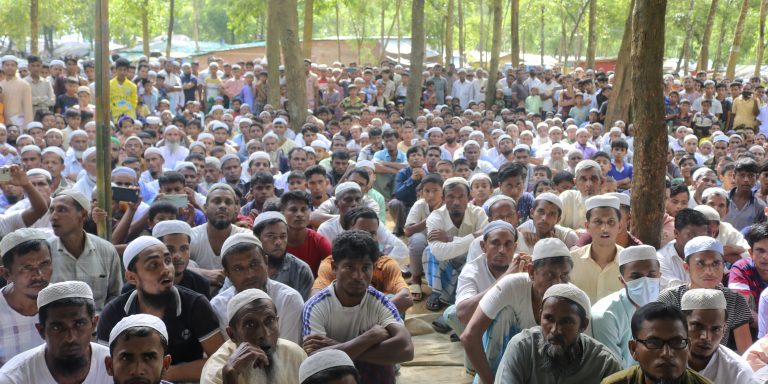INTELBRIEF
October 21, 2022
IntelBrief: Violence in Rohingya Refugee Camps Underscores Risks and Challenges

Bottom Line Up Front
- Earlier this week, two Rohingya leaders were brutally killed in overcrowded, sprawling refugee camps in Bangladesh, which house nearly one million refugees.
- Many believe the Arakan Rohingya Salvation Army (ARSA) is responsible for the killings, though Bangladeshi officials deny this; some accuse the group of serving the aims of the junta in Myanmar.
- A sustainable solution seems unlikely for the Rohingya, who remain a stateless community fearful of returning home and often unable to integrate with host country communities.
- Acute humanitarian and security challenges in the camps provide conditions ripe for exploitation by violent extremist and criminal groups, though there is widespread reluctance to discuss some of these issues lest it appear to justify violence against the Rohingya or jeopardize repatriation efforts.
Earlier this week, two Rohingya leaders were brutally killed in the overcrowded, sprawling refugee camps in Bangladesh. Genocide, crimes against humanity, and ethnic cleansing have driven the Muslim community to flee violence in Myanmar, with an estimated 750,000 crossing into Bangladesh since 2017 alone, according to the UNHCR. The camps in Cox’s Bazaar, on the coast near the border, house upwards of 600,000 refugees, exceeding the size of many small cities and stretching the resources and capacities of the host country and communities. While the government of Bangladesh has pushed for repatriation, ongoing violence and instability in Myanmar – and the prospect of further ethnic violence against their community - has reduced the willingness of many refugees to return. The latest killing of two community leaders, Maulvi Mohammad Yunus (38), and Mohammad Anwar (38), has raised questions again about the role and impact of the Arakan Rohingya Salvation Army (ARSA), which many believe responsible.
Attribution for the two killings of the Rohingya leaders remains murky, with many refugees reportedly unwilling to speak up about them and the government unwilling to acknowledge the group for fear of jeopardizing repatriation opportunities. Rumors about the ARSA, an insurgent organization fighting against the Myanmar military, are rife. The Daily Star, an English language daily newspaper in Bangladesh, reported that “They [community leaders in the camps] said a huge number of ARSA members are agents of Myanmar and they get regular patronage from the Myanmar military.” There have been concerns among regional and international actors that raising the question of potential violent extremism and terrorism-related to ARSA will appear to substantiate the narrative used by the junta in Myanmar to justify the brutal tactics against the Rohingya, described by the UN Human Rights Chief in 2017 as a “textbook example of ethnic cleansing.” The army in Myanmar, the Tatmadaw, could use the actions of this one group to foment Islamophobia and violence against the Rohingya, some experts have cautioned; for that reason, some have even voiced concerns that they support the group to create a pretext to expel the Rohingya from their homelands in Rakhine state.
While much international attention has focused on camps holding ISIS-associated detainees in Syria and Iraq, the conditions in the camps housing Rohingya refugees are reputed to be among the worst, globally. Moreover, there appears little prospect for a sustainable resolution in the near future; while United Nations bodies can provide humanitarian and development assistance, there remains little prospect of any progress in the Security Council so long as China and its allies shield Myanmar. This summer, the minister of housing and urban affairs in India tweeted that the government would provide housing support for the refugees, using that term rather than the one more often used by the government, “illegal immigrants.” However, reportedly after protests from right-wing Hindu organizations, the Home Ministry denied that it was providing housing for the “Rohingya illegal foreigners.” Consequently, Rohingya communities remain in limbo and the largest stateless community, with few options to either return or integrate into their host communities. Such conditions raise serious questions about the humanitarian crises and security challenges evolving in the camps.
Reports suggest that ARSA is closely involved with drug trafficking and criminal activities in the camps, and there has been some concern that violent extremist groups could exploit the poor, squalid conditions and insecurity in the camps to mobilize and recruit within the refugee community. However, discussions of ARSA’s presence and role remain contentious. Some reports indicate that the local police confirmed ARSA’s role in the killings this week while other reports quote Bangladeshi officials as denying their existence. The Daily Star newspaper quotes a senior police officer as saying, “There is no ARSA presence in the camps. Those who say otherwise should be identified. It’s a blatant lie. They have an evil agenda to portray the Rohingya as criminals.”
The challenging conditions in the camps and the protracted nature of the refugee situation, combined with uncertainty about the future and little sign of a welcome in their home country, can create an environment that violent extremist and criminal groups can exploit. There have been few efforts within the camps to put in place measures to prevent or counter violent extremism, and in view of the brutality with which the junta in Myanmar has suppressed protests, including the execution of opposition members under counterterrorism legislation, it is unclear whether these would address the fundamental challenges facing the Rohingya community. What is clear that the combination of risks and challenges in the camps pose a critical humanitarian and security threat that the international community must continue to help resolve.